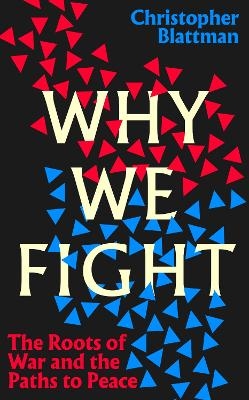
Why We Fight
The Roots of War and the Paths to Peace
Seiten
2022
Viking (Verlag)
978-0-241-44451-1 (ISBN)
Viking (Verlag)
978-0-241-44451-1 (ISBN)
An acclaimed expert on violence and seasoned peacebuilder explains the five reasons why conflict (rarely) blooms into war, and how to interrupt that deadly process.
'Nothing could be more relevant today than war and peace. Why We Fight by Christopher Blattman is an outstanding and original book on this topic' Martin Wolf, Financial Times
It's easy to overlook the underlying strategic forces of war, to see it solely as a series of errors, accidents, and emotions gone awry. It's also easy to forget that war shouldn't happen-and most of the time it doesn't. Around the world there are millions of hostile rivalries, yet only a tiny fraction erupt into violence. Too many accounts of conflict forget this.
With a counterintuitive approach, Blattman reminds us that most rivals loathe one another in peace. That's because war is too costly to fight. Enemies almost always find it better to split the pie than spoil it or struggle over thin slices. So, in those rare instances when fighting ensues, we should ask: what kept rivals from compromise?
Why We Fight draws on decades of economics, political science, psychology, and real-world interventions to lay out the root causes and remedies for war, showing that violence is not the norm; that there are only five reasons why conflict wins over compromise; and how peacemakers turn the tides through tinkering, not transformation.
From warring states to street gangs, ethnic groups and religious sects to political factions, there are common dynamics to heed and lessons to learn. Along the way, we meet vainglorious European monarchs, African dictators, Indian mobs, Nazi pilots, British football hooligans, ancient Greeks, and fanatical Americans.
What of remedies that shift incentives away from violence and get parties back to deal-making? Societies are surprisingly good at interrupting and ending violence when they want to-even the gangs of Medellín, Columbia do it. Realistic and optimistic, this is book that lends new meaning to the old adage, "Give peace a chance."
'Nothing could be more relevant today than war and peace. Why We Fight by Christopher Blattman is an outstanding and original book on this topic' Martin Wolf, Financial Times
It's easy to overlook the underlying strategic forces of war, to see it solely as a series of errors, accidents, and emotions gone awry. It's also easy to forget that war shouldn't happen-and most of the time it doesn't. Around the world there are millions of hostile rivalries, yet only a tiny fraction erupt into violence. Too many accounts of conflict forget this.
With a counterintuitive approach, Blattman reminds us that most rivals loathe one another in peace. That's because war is too costly to fight. Enemies almost always find it better to split the pie than spoil it or struggle over thin slices. So, in those rare instances when fighting ensues, we should ask: what kept rivals from compromise?
Why We Fight draws on decades of economics, political science, psychology, and real-world interventions to lay out the root causes and remedies for war, showing that violence is not the norm; that there are only five reasons why conflict wins over compromise; and how peacemakers turn the tides through tinkering, not transformation.
From warring states to street gangs, ethnic groups and religious sects to political factions, there are common dynamics to heed and lessons to learn. Along the way, we meet vainglorious European monarchs, African dictators, Indian mobs, Nazi pilots, British football hooligans, ancient Greeks, and fanatical Americans.
What of remedies that shift incentives away from violence and get parties back to deal-making? Societies are surprisingly good at interrupting and ending violence when they want to-even the gangs of Medellín, Columbia do it. Realistic and optimistic, this is book that lends new meaning to the old adage, "Give peace a chance."
Christopher Blattman is the Ramalee E. Pearson Professor of Global Conflict Studies at the University of Chicago in the Harris School of Public Policy and The Pearson Institute. As a young man, he met his future wife in a Kenyan internet café, where she set him on a path to working on conflict and international development. He's now done so for 22 years. Through his academic work he has witnessed (and helped to stem) violence around the world. Blattman writes regularly for The New York Times, Washington Post, Wall Street Journal, Foreign Policy and Foreign Affairs, among others. For 15 years he has run one of the most popular blogs on international affairs and global development. This is his first trade book.
| Erscheinungsdatum | 20.04.2022 |
|---|---|
| Verlagsort | London |
| Sprache | englisch |
| Maße | 153 x 234 mm |
| Gewicht | 484 g |
| Themenwelt | Geisteswissenschaften ► Geschichte ► Allgemeine Geschichte |
| Sozialwissenschaften ► Politik / Verwaltung ► Staat / Verwaltung | |
| ISBN-10 | 0-241-44451-9 / 0241444519 |
| ISBN-13 | 978-0-241-44451-1 / 9780241444511 |
| Zustand | Neuware |
| Informationen gemäß Produktsicherheitsverordnung (GPSR) | |
| Haben Sie eine Frage zum Produkt? |
Mehr entdecken
aus dem Bereich
aus dem Bereich
eine Familiengeschichte der Menschheit
Buch | Hardcover (2023)
Klett-Cotta (Verlag)
CHF 68,60
Eine wahre Geschichte von Schiffbruch, Mord und Meuterei
Buch | Hardcover (2024)
C.Bertelsmann (Verlag)
CHF 34,95


